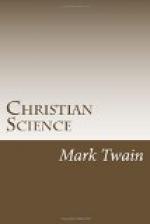God is Love. Can we ask Him to be more? God is Intelligence. Can we inform the infinite Mind, or tell Him anything He does not already comprehend? Do we hope to change perfection? Shall we plead for more at the open fount, which always pours forth more than we receive? The unspoken prayer does bring us nearer the Source of all existence and blessedness.
Asking God to be God is a “vain repetition.” God is “the same yesterday, and to-day, and forever”; and He who is immutably right will do right, without being reminded of His province. The wisdom of man is not sufficient to warrant him in advising God.
Who would stand before a blackboard, and pray the principle of mathematics to work out the problem? The rule is already established, and it is our task to work out the solution. Shall we ask the divine Principle of all goodness to do His own work? His work is done; and we have only to avail ourselves of God’s rule, in order to receive the blessing thereof.
The divine Being must be reflected by man—else man is not the image and likeness of the patient, tender, and true, the one “altogether lovely”; but to understand God is the work of eternity, and demands absolute concentration of thought and energy.
How empty are our conceptions of Deity! We admit theoretically that God is good, omnipotent, omnipresent, infinite, and then we try to give information to this infinite Mind; and plead for unmerited pardon, and a liberal outpouring of benefactions. Are we really grateful for the good already received? Then we shall avail ourselves of the blessings we have, and thus be fitted to receive more. Gratitude is much more than a verbal expression of thanks Action expresses more gratitude than speech.
If we are ungrateful for Life, Truth, and Love, and yet return thanks to God for all blessings, we are insincere; and incur the sharp censure our Master pronounces on hypocrites. In such a case the only acceptable prayer is to put the finger on the lips and remember our blessings. While the heart is far from divine Truth and Love, we cannot conceal the ingratitude of barren lives, for God knoweth all things.
What we most need is the prayer of fervent desire for growth in grace, expressed in patience, meekness, love, and good deeds. To keep the commandments of our Master and follow his example, is our proper debt to Him, and the only worthy evidence of our gratitude for all He has done. Outward worship is not of itself sufficient to express loyal and heartfelt gratitude, since He has said: “If ye love Me, keep My Commandments.”
The habitual struggle to be always good, is unceasing prayer. Its motives are made manifest in the blessings they bring—which, if not acknowledged in audible words, attest our worthiness to be made partakers of Love.
Simply asking that we may love God will never make us love Him; but the longing to be better and holier—expressed in daily watchfulness, and in striving to assimilate more of the divine character—this will mould and fashion us anew, until we awake in His likeness. We reach the Science of Christianity through demonstration of the divine nature; but in this wicked world goodness will “be evil spoken of,” and patience must work experience.




